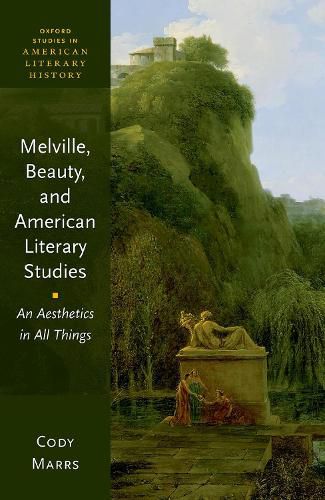Readings Newsletter
Become a Readings Member to make your shopping experience even easier.
Sign in or sign up for free!
You’re not far away from qualifying for FREE standard shipping within Australia
You’ve qualified for FREE standard shipping within Australia
The cart is loading…






When people think about Herman Melville, they often think about experiences of madness, horror, and the sublime. But throughout his life, Melville was deeply and persistently interested in beauty. In this fascinating book, Cody Marrs retraces Melville’s engagements with beauty and provides a revisionary account of Melville’s philosophy, aesthetics, and literary career. In writings such as Moby-Dick, Timoleon, and Weeds and Wildings, Melville reflects on the nature, origins, and effects of beauty, and the ways in which beauty is inexorably bound up with considerations of religion, science, ecology, art, literature, and metaphysics. Melville’s writing indicates that beauty is, ultimately, an experience of non-sovereignty, a felt recognition of the self’s interdependence.
In a series of fresh readings of Melville’s works, ranging from the most to the least canonical, Marrs demonstrates how and why Melville developed this understanding of beauty, and the ways it resonates with recent scholarship on aesthetics, posthumanism, ecocriticism, materialism, and the means and methods of American literary studies. By recentring Melville’s treatment of beauty and exploring its philosophical and scholarly implications, Marrs provides a new, evocative perspective on Melville as well as the broader field of American literary studies.
$9.00 standard shipping within Australia
FREE standard shipping within Australia for orders over $100.00
Express & International shipping calculated at checkout
When people think about Herman Melville, they often think about experiences of madness, horror, and the sublime. But throughout his life, Melville was deeply and persistently interested in beauty. In this fascinating book, Cody Marrs retraces Melville’s engagements with beauty and provides a revisionary account of Melville’s philosophy, aesthetics, and literary career. In writings such as Moby-Dick, Timoleon, and Weeds and Wildings, Melville reflects on the nature, origins, and effects of beauty, and the ways in which beauty is inexorably bound up with considerations of religion, science, ecology, art, literature, and metaphysics. Melville’s writing indicates that beauty is, ultimately, an experience of non-sovereignty, a felt recognition of the self’s interdependence.
In a series of fresh readings of Melville’s works, ranging from the most to the least canonical, Marrs demonstrates how and why Melville developed this understanding of beauty, and the ways it resonates with recent scholarship on aesthetics, posthumanism, ecocriticism, materialism, and the means and methods of American literary studies. By recentring Melville’s treatment of beauty and exploring its philosophical and scholarly implications, Marrs provides a new, evocative perspective on Melville as well as the broader field of American literary studies.